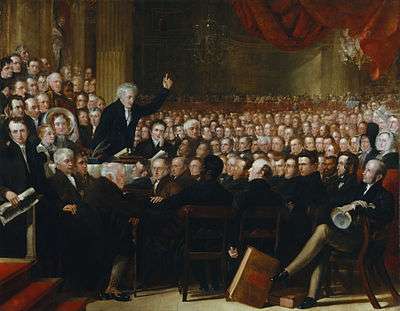Jacob Post
| Jacob Post | |
|---|---|
 Post at the 1840 Anti-Slavery Convention. On his left is Lady Byron | |
| Born | 1774 |
| Died |
1855 Islington |
| Resting place | Winchmore Hill, Middlesex |
| Nationality | British |
| Known for | Writing |
| Religion | Quaker |
Jacob Post (1774–1855) was a Quaker[1] and a religious writer.
Life
Jacob Post was born at Whitefriars in London on 12 September 1774. His parents, John and Rosamund Post, enrolled him at the relatively new Ackworth School in Yorkshire which was run by the Society of Friends. By 1787 Post moved to Islington and wrote in support of the emerging evangelical section of the Quakers. In 1812 he founded a local section of the Bible Society. In 1837, his eighteen-year-old son died and the following year he published Extracts from the Diary of Frederick James Post under joint authorship.

- ^ The Anti-Slavery Society Convention, 1840, Benjamin Robert Haydon, 1841, National Portrait Gallery, London, NPG599, Given by British and Foreign Anti-Slavery Society in 1880
In 1840 his portrait was included with other notables in a painting of the 1840 Anti-Slavery Convention in London.[1] His wife, Elizabeth Post, died in 1844 and Post died on 1 April 1855 at his house in Islington. Besides two children's books, Post published several other books including a memoir of the founders of the Society of Friends George Fox and William Penn, the founder of Pennsylvania.[2]
Works include
- Extracts from the Diary of Frederick James Post and other Manuscripts, with a Memoir (1838)
- Some Popular Customs amongst Christians questioned and compared with Gospel Precepts and Examples (1839)
- On the History and Mystery of (those called) the Sacraments; shewing them to be Jewish Institutions... (1846)
- The Bible: the Book for All, (1848)
- Popular Memoir of W. Penn, (1850)
- A Brief Memoir of George Fox … for the Information of Strangers (1854)[3]
References
- 1 2
- ↑ Charlotte Fell-Smith, ‘Post, Jacob (1774–1855)’, rev. K. D. Reynolds, Oxford Dictionary of National Biography, Oxford University Press, 2004 accessed 19 January 2010
- ↑ James Post, Dictionary of National Biography